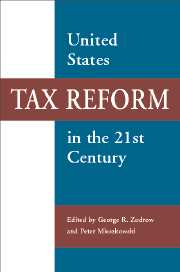Book contents
- Frontmatter
- Contents
- List of Contributors
- Preface
- 1 Introduction: The Fundamental Question in Fundamental Tax Reform
- 2 Behavioral Responses to a Consumption Tax
- 3 The Economic Impact of Fundamental Tax Reform
- 4 Capital Income Taxation in Tax Reform: Implications for Analysis of Distribution and Efficiency
- 5 International Aspects of Fundamental Tax Reform
- 6 Distributive Analysis of Fundamental Tax Reform
- 7 The Role of Administrative Issues in Tax Reform: Simplicity, Compliance, and Administration
- 8 Evaluating the National Retail Sales Tax from a VAT Perspective
- 9 Transitional Issues in the Implementation of a Flat Tax or a National Retail Sales Tax
- 10 Historical and Contemporary Debate on Consumption Taxes
- 11 The Politics and Ideology of Fundamental Tax Reform
- Bibliography
- Index
1 - Introduction: The Fundamental Question in Fundamental Tax Reform
Published online by Cambridge University Press: 23 October 2009
- Frontmatter
- Contents
- List of Contributors
- Preface
- 1 Introduction: The Fundamental Question in Fundamental Tax Reform
- 2 Behavioral Responses to a Consumption Tax
- 3 The Economic Impact of Fundamental Tax Reform
- 4 Capital Income Taxation in Tax Reform: Implications for Analysis of Distribution and Efficiency
- 5 International Aspects of Fundamental Tax Reform
- 6 Distributive Analysis of Fundamental Tax Reform
- 7 The Role of Administrative Issues in Tax Reform: Simplicity, Compliance, and Administration
- 8 Evaluating the National Retail Sales Tax from a VAT Perspective
- 9 Transitional Issues in the Implementation of a Flat Tax or a National Retail Sales Tax
- 10 Historical and Contemporary Debate on Consumption Taxes
- 11 The Politics and Ideology of Fundamental Tax Reform
- Bibliography
- Index
Summary
Should the United States adopt a “fundamental tax reform” in the form of replacing its current personal and corporate income tax system with some form of consumption-based taxation? This question has been the central issue of debates on tax reform for the past twenty-five years. The discussion was kindled by a seminal article by Andrews (1974), who extolled the administrative advantages of taxation based on consumption rather than income. Shortly thereafter, the U.S. Treasury (1977) issued its much-cited report Blueprints for Basic Tax Reform, which described in detail the merits of consumption taxes relative to income taxes and discussed alternative methods of implementing consumption taxation; similar studies favorable to consumption-based taxes were published contemporaneously in Great Britain (Institute for Fiscal Studies, 1978), Australia (Matthews Committee, 1975), and Sweden (Lodin, 1978). These contributions were followed by the influential flat tax proposal developed by Hall and Rabushka (1983, [1985] 1995) and related studies in the U.S. and elsewhere, including Aaron and Galper (1985), Bradford (1986), McLure et al. (1990), R. Hall (1995), Weidenbaum (1996), McLure and Zodrow (1996a), and Seidman (1997). All of these studies argue that consumption-based tax systems are inherently superior to a tax system based on income in terms of the three standard criteria public finance economists use to evaluate alternative tax systems – efficiency, equity, and simplicity.
Scholarly interest in fundamental tax reform has been accompanied by heightened political interest in replacing the income tax with a consumption tax.
- Type
- Chapter
- Information
- United States Tax Reform in the 21st Century , pp. 1 - 24Publisher: Cambridge University PressPrint publication year: 2002
- 1
- Cited by



